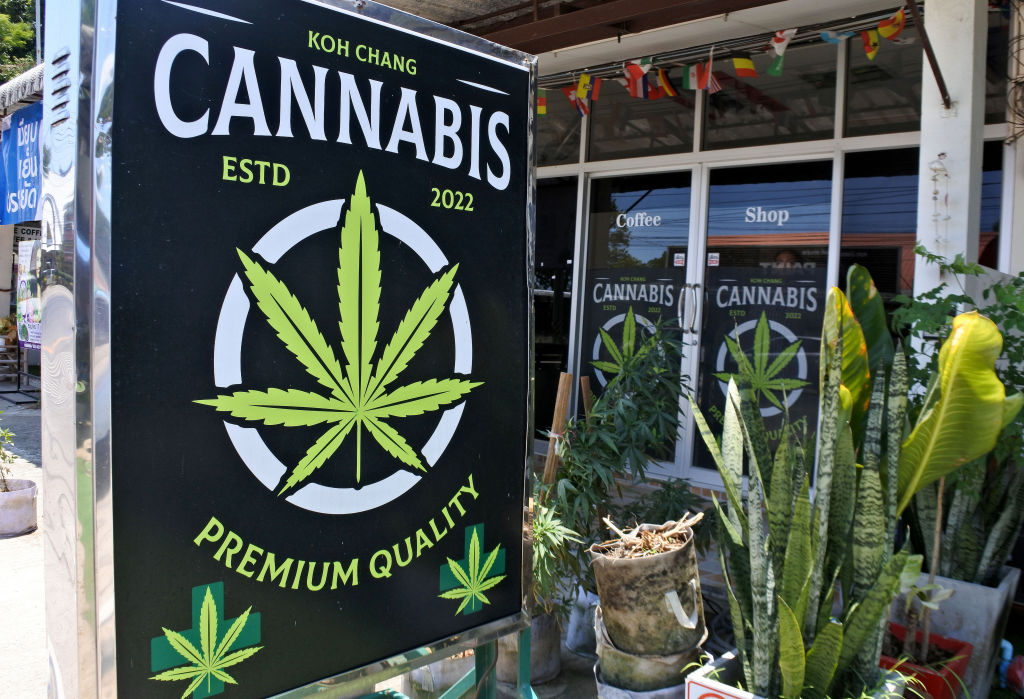Thailand’s move to reclassify cannabis as a narcotic threatens to trigger street protests and class-action suits by owners of thousands of dispensaries which sprung across the country in the wake of decriminalization two years ago.
A complete re-criminalization ordered by Prime Minister Srettha Thavisin on Wednesday will also push the cannabis trade underground, said Rattapon Sanrak, owner of Bangkok-based dispensary Highland Cafe. Writing Thailand’s Cannabis Future, an advocacy group, said it will hold a protest against the move in Bangkok on May 16.
Cannabis currently enjoys the status of a “controlled herb” in Thailand and there is no outright ban on its recreational use, allowing nearly 8,000 dispensaries to open since it was decriminalized in 2022. Srettha’s directive to re-label cannabis as a “category five” narcotic will make it a crime to “produce, sell, import, export, or possess” the plant and use it, according to Thai drug laws. Cannabis for medical and health purposes will still be allowed, according to the premier.
“We’re all doing everything by the book but then suddenly the book is going to change,” Rattapon said. “We’re gearing up to protest and preparing to file lawsuits in the event it happens.”
The policy volte-face is another blow to Thailand’s nascent cannabis industry after decriminalization was pitched as a way to boost agricultural income and wellness tourism. Liberal use of cannabis became a hot-button political issue ahead of the Thailand’s national election last year. With efforts to establish regulations around the marijuana industry failing, concerns grew about the social impact of addiction from easy availability of the drug.
Watch: Inside Thailand’s Complicated Legalization of Weed
The policy reversal is part of ruling Pheu Thai Party’s hard-line anti-drug campaign. Earlier this week, Srettha gave a 90-day deadline for law enforcement and local authorities to crack down on drugs in 25 provinces considered as “red zones.”
Bhumjaithai Party, which spearheaded the decriminalization policy under the previous administration but is now part of Srettha’s government, said a bill to regulate recreational use would be more effective than outlawing the plant entirely. But the premier defended the move on Thursday saying “whatever we decide to do, we do it for the people.”
Thailand’s nascent cannabis industry has battled legal uncertainties since inception as lawmakers couldn’t agree on how to regulate it. The first attempt to pass a bill to control cannabis use last year was blocked in parliament as part of political jockeying ahead of the election. The most recent attempt under the Srettha government to outlaw recreational use and tighten licensing rules on planting, sales, exports and imports of cannabis was stalled by bureaucratic process.
More than 1 million households have registered with Thai authorities to plant cannabis in addition to commercial cultivation by companies seeking to benefit from the booming demand.
Once the health ministry wraps up the process of classifying cannabis as a category five drug, its possession could land one a jail sentence of up to 15 years and a maximum fine of 1.5 million baht ($40,600).
Cannabis advocates are urging health authorities to weigh the pros and cons of cannabis in comparison to alcohol and cigarettes and use science and facts to determine what should be drugs.
The constant policy flip-flop will not only risk damaging foreign investor confidence but also create “wide ripple effects” across the industry, causing legitimate cannabis businesses to shut down, workers to lose jobs and growers to lose income from the cash crop, Rattapon of Highland Cafe said.
“Instead of regulating the industry properly, you’re choosing to close it up and make it worse by pushing it underground,” Rattapon said.
H/T: time.com



